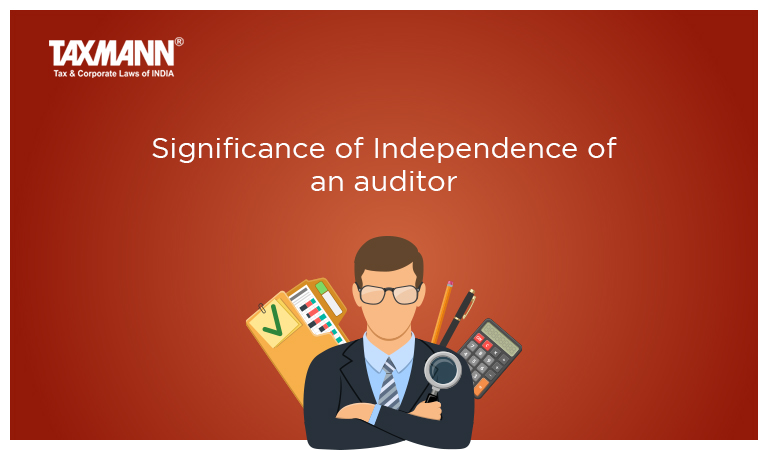Significance of Independence of an auditor
- Blog|News|Account & Audit|
- 2 Min Read
- By Taxmann
- |
- Last Updated on 20 August, 2022

SA200 overall objectives of the independent auditor, require that the auditor has to comply with relevant ethical requirements, relating to financial statement audit engagements including those pertaining to independence.
The auditor should be independent not only in his mind but also in his appearance. The relationship between the auditor and his client should be such that, he should himself satisfied about his independence and, no unbiased person would be forced to the conclusion that, on an objective assessment of the circumstances, there is likely to be an abridgement of his independence.
Section 141(3)(e) of the Companies Act 2013, disqualifies a firm to appoint as statutory auditor of an entity that has a business relationship with the company, or its subsidiary, its holding company or associate company, or with a subsidiary of such holding company or associate company.
Rule 10(4) of the Companies (Audit and Auditors) Rules, 2014, defines the business relationship, for this purpose, it includes any commercial transaction except only those professional services that can be rendered by an auditor in terms of Section 144.
Also, section 141(3)(i) disqualifies an auditor who renders any service prohibited by Section 144. Section 141(4) further says that where an existing auditor incurs any of the disqualifications listed in Section 141(3) after his appointment, he shall immediately vacate his office as such auditor, the vacation being treated as a casual vacancy.
However, while referring to the “Audit Quality Review Report” (AQRR) issued by “National Financial Reporting Authority” (NFRA), various instances were reported wherein the Audit Firm failed to comply with the provisions regarding auditor’s independence by violating section 144 of the Companies Act, non-complying with the fundamental principles of the ICAI Code of Ethics, failure to comply with Para 14 of SA 200 and SQC 1 etc.
Click Here To Read The Full Story
Disclaimer: The content/information published on the website is only for general information of the user and shall not be construed as legal advice. While the Taxmann has exercised reasonable efforts to ensure the veracity of information/content published, Taxmann shall be under no liability in any manner whatsoever for incorrect information, if any.

Taxmann Publications has a dedicated in-house Research & Editorial Team. This team consists of a team of Chartered Accountants, Company Secretaries, and Lawyers. This team works under the guidance and supervision of editor-in-chief Mr Rakesh Bhargava.
The Research and Editorial Team is responsible for developing reliable and accurate content for the readers. The team follows the six-sigma approach to achieve the benchmark of zero error in its publications and research platforms. The team ensures that the following publication guidelines are thoroughly followed while developing the content:
- The statutory material is obtained only from the authorized and reliable sources
- All the latest developments in the judicial and legislative fields are covered
- Prepare the analytical write-ups on current, controversial, and important issues to help the readers to understand the concept and its implications
- Every content published by Taxmann is complete, accurate and lucid
- All evidence-based statements are supported with proper reference to Section, Circular No., Notification No. or citations
- The golden rules of grammar, style and consistency are thoroughly followed
- Font and size that’s easy to read and remain consistent across all imprint and digital publications are applied



 CA | CS | CMA
CA | CS | CMA
